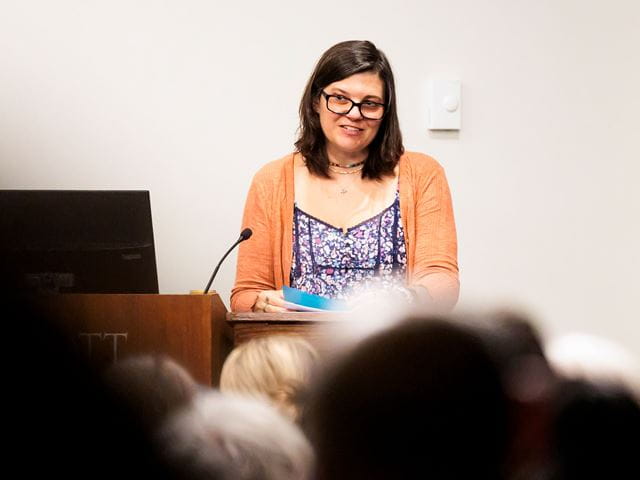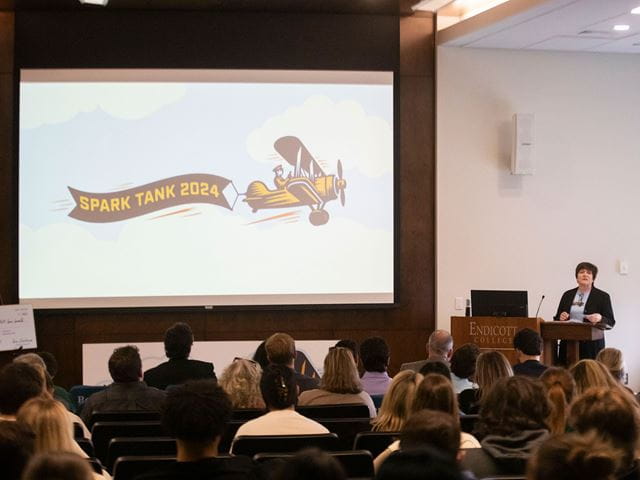Collection Development
Building and maintaining the library's collection is a careful and collaborative effort between Halle Library's professional staff and faculty subject experts, with student and staff input as well.
Collection Development
Collection development includes budget allocation; item selection; item purchasing and/or subscription, acquisition by donation or gift to the College; deaccession of materials deemed obsolete or redundant.
Halle Library acquires materials primarily to support the curricular work of our undergraduate, graduate, and doctoral students. Halle Library also supports individual research by Endicott College faculty and students by utilizing interlibrary loan, document delivery services, and purchase of materials as budget parameters allow. Additionally, select works of particular interest to Endicott College (titles authored by Endicott College alumni, faculty, or staff; visiting authors, support for interdisciplinary initiatives, and so on) are purchased as budget parameters allow.
- Typically a single copy of a title is purchased. Additional copies may be obtained due to factors such as heavy or continual use.
- Textbooks are typically not added to the collection unless considered a classic in the field or their content is considered the best source of information on a subject.
- Academic journals are acquired and made available in electronic format via Halle Library licensed databases whenever possible.
- Academic journals in print format are acquired when they are unavailable at reasonable cost in electronic format, and/or are needed specifically in print format to support curricular programming (example: photography and graphic design illustration courses).
The library director and library staff share practical responsibility for growing and maintaining the collection. Endicott College faculty, staff, and students may make acquisition recommendations using the Halle Library Resource Request Form.
Donation Policy
Donations to the Halle Library occasionally supplement budgeted acquisition resources; these materials are evaluated by the same criteria as any other potential addition to the collection. Not all donated materials can be accepted, nor will any accepted items that are ultimately not added to the collection be returned to donors. Halle Library will not accept gifts with usage restrictions, nor will a dollar value be assigned to donated items for tax purposes. Donations to Halle Library are reported to the Office of Institutional Advancement. All gifts are final, with the donor relinquishing all rights to ownership and dispensation.
Selection Criteria:
- Relevance to the curriculum.
- Faculty endorsement of material.
- Strength of present holdings in the subject area.
- Cost
- Importance of the material relative to its field of study.
- Reputation of the author and publisher.
- Potential for interdisciplinary use.
- Accessibility for remote users.
- Availability in other NOBLE libraries.
- Currency and timeliness
- Balanced representation concerning controversial issues or topics.
Halle Library will not accept the following as donations:
- Materials bearing ownership markings of another library or institution and lacking any indication of being withdrawn from the owning institution’s collection
- Textbooks
- Law manuals
- Print periodicals/magazine serials
- Newspaper or clipping collections
- Outmoded formats such as VHS tapes, audio cassettes, film reels, vinyl LP records, etc.
- Items in poor physical condition
Donated items must be brought to Halle Library. Library staff will not travel to pick up donated items.
Collection Management
In order to maintain a current, vibrant circulating collection of ongoing relevance to curricular support efforts, regular weeding/de-acquisition of the collection is an essential component of collection development and maintenance. Some guidelines:
- Faculty experts in their chosen subject areas are encouraged to identify to library staff those works which they deem to be candidates for removal from the library collection.
- Content has been superseded by new findings in the subject area.
- Information is outdated, irrelevant, or inaccurate pursuant to curricular support efforts.
- Material is in poor physical condition.
- Intellectual content is duplicated in another format
- Outgoing weeded material is donated to book charities whenever possible, for potential redistribution or recycling efforts.


